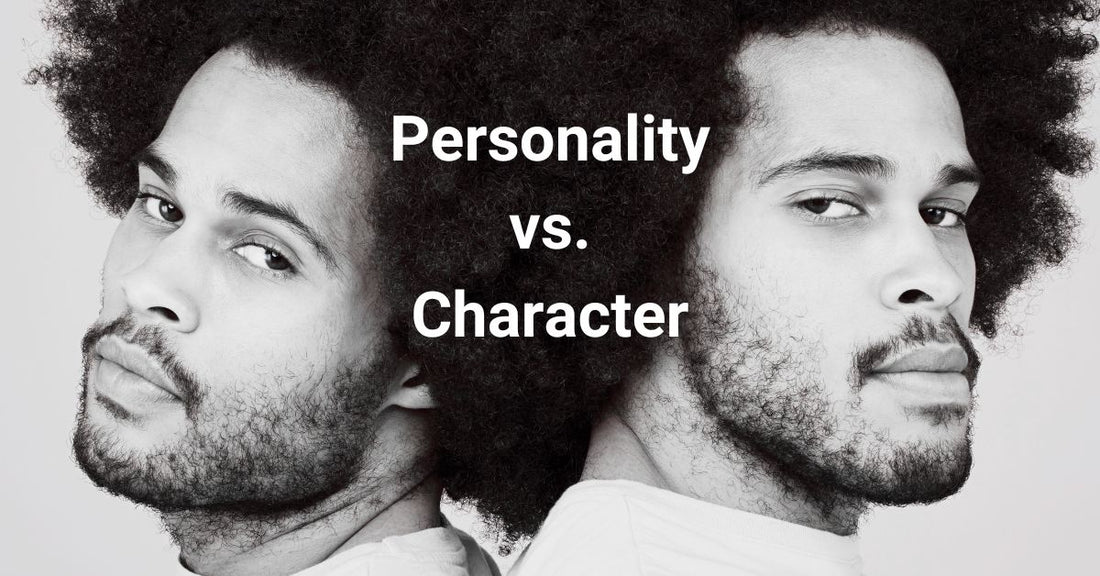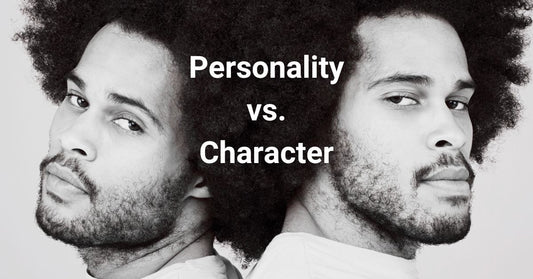
Difference Between Personality and Character Traits | Why it is Good to Know
Luke FeldbruggeShare
When you think about yourself, and primarily what makes you who you are, do you consider the difference between personality and character? You probably hear these terms thrown around all the time, but they actually refer to two very different aspects of who you are. Understanding the difference between personality and character can unlock powerful insights into what you believe and the decisions you make; and also how you behave and react to different people and experiences.
In this post, we will explore the difference between personality and character, what sets them apart and why it matters. But, we will also look at how character and personality essentially work together to shape a person into who they are, and how that plays a role in their personal development, relationships, and professional pursuits.
What is the Difference Between Personality and Character?
Even though there are similarities between character traits and personality traits, and your personality and character work together to make you who you are, there are a few ways to break down the difference between personality and character:
External vs. Internal
- Personality traits reflect your external behavior and how you interact with the outside world. Other people tend to pick up on these traits fairly quickly because they can easily observe how one is acting in the moment.
- Character traits reflect internal values, morals and beliefs; your sense of right and wrong, your work ethic, and your integrity. Learning these traits about someone tends to take more time, because you need to observe the decisions one makes to better understand their character.
Reactive vs. Deliberate
- Personality tends to be more reactive. For example, an extroverted person may feel energized by a busy social event, while an introvert might need some alone time to recharge.
- Character is more deliberate and reflective. You build your character over time by making conscious decisions about how you want to live, what values you uphold, and how you handle adversity.
Stable vs. Evolving
- Personality traits remain relatively stable throughout your life, although they can be adapted depending on your environment. For instance, a naturally introverted person can learn to thrive in public-speaking situations, but their core tendency for introversion is still there.
- Character traits can change over time as you mature. Life experiences such as overcoming challenges, learning from failures, or making ethical choices; have a big influence on the development of character. While personality remains largely fixed, character is something you can build, mold and master.
What Is Personality?
Your personality is what makes you you in social settings. It’s the traits people notice first about you, like whether you’re funny, quiet, or energetic. Some psychologists describe personality as a set of traits that remain relatively consistent over time, making up the external "face" you show to the world.
Personality describes how you behave or act for others and the outside world. It is rooted in your emotional, social/cultural, or physical state, as it appears externally to others based on how you react and behave.
There are many theories on human personality, but instead of covering those here, let’s look at what is commonly associated with influencing one’s personality. Based on studies, research findings, and the science of psychology, these are some of the things that may influence one’s personality:
Biological and Genetic Influences on Personality
- Genetics - Studies done with twin siblings reveal that genetics account for a significant portion of personality differences, leading to the understanding that there’s a strong hereditary component to one’s personality.
- Neurological Bases of Personality - Research shows that certain brain structures are linked to personality due to their ability to influence decision-making and emotional regulation. The levels of chemical neurotransmitters like dopamine and serotonin also play a role in how an individual reacts in certain situations; like taking risks or altering one’s mood.
Environmental and Social Influences on Personality
- Family and Early Life - The relationship between a child and their caregiver can influence the child’s personality development. Two important areas are how a child learns to regulate their emotions, and how a child learns to establish and maintain healthy social relationships.
- Culture and Personality - Cultural context influences personality traits. For example, collectivist cultures may emphasize traits like agreeableness and harmony, while individualistic cultures value traits such as autonomy and assertiveness.
- Situational Influences - How one’s personality reacts can depend on the situation one’s experiencing. What that means is even though one’s personality traits are generally stable and consistent, certain situations can bring out different aspects of an individual’s personality. This is known as "situational variability."
Personality Development Across Life Stages
- Childhood and Adolescence - Personality development is particularly dynamic during childhood and adolescence, as early experiences and developmental milestones influence one’s personality traits.
- Adulthood - Even though research shows that personality traits are generally stable, certain traits may evolve as individuals encounter major life events such as marriage, career changes, or parenthood.
- Late Adulthood - Later in life one’s personality may shift as individuals reflect on their lives, potentially becoming more emotionally stable, and finding different ways to learn new things and share their experiences.
As you can see, an individual's personality is complex because it is shaped by a combination of biological, environmental, and social factors. Understanding the basic fundamental concept of one's personality not only enhances self-awareness but may also offer some ways to positively affect your relationships, career choices, and overall well-being.
While it provides a framework for understanding one's behavior, it is important to note that it is also influenced by one's character.
What Is Character?
A person’s character refers to the moral and ethical qualities that define a person’s inner values and decision-making that drives actions. One’s character is shaped by deeply held principles, and it affects how individuals respond to ethical challenges.
A person’s character steers one’s decision-making, driving one’s actions based on the values that are most important to that person. Historically, character has been at the core of philosophical and religious teachings, providing guidance on how to live a virtuous and moral life.
Character is less about how you act in the moment, and more about why you choose to act that way.
Character is feeling what you believe, and personality is the outward expression of those internal feelings.
True Mydentity recognizes 58 positive character traits.
So, what things have a tendency to influence one’s character?
Early Childhood and Family Experiences
Parenting styles, moral guidance, and role models significantly influence early childhood character development by shaping how children perceive right and wrong, empathy, and responsibility. Within the family, children learn by observing and interacting with caregivers and siblings.
Influence of Social Environment on Character
Social interactions and friendships outside the family help develop team or group values and beliefs, and also teaches how to resolve conflict.
Community involvement, such as participation in clubs or volunteer work, fosters a sense of belonging, responsibility, and civic duty; encouraging individuals to adopt shared moral and ethical standards.
Exposure to diverse cultural, social, and ethical perspectives can broaden one's worldview; offering more of an open mind to different ideas, traditions and ways of living.
Cultural and Religious Values
Cultural norms and religious teachings shape character development by providing a moral framework that influences how individuals perceive right and wrong. Cultural norms determine the virtues and behaviors considered admirable or ethical within a society. Religious teachings often emphasize universal moral principles and encourage adherence to a higher ethical standard.
These cultural and religious systems instill a sense of duty, and can influence how individuals form their personal moral compass.
Influence of Personal Experiences and Challenges
Life events and overcoming adversity significantly influence character development. Challenging experiences, such as loss, failure, or hardship, often push people to reflect on their values and to adapt to difficult circumstances. Facing and overcoming difficult situations may also help individuals gain a deeper understanding of the struggles that others may face; building empathy.
Education and Learning Environments
A formal education and exposure to diverse perspectives encourage moral reasoning, ethical behavior, and an understanding of complex social issues. In schools, students engage with different viewpoints through literature, history, and debate. This challenges them to reflect on their values and develop their own sense of right and wrong.
Role of Personality and Character in Shaping Personal Growth, Career and Relationships
Generally, if someone's personality is revealed by how they act in the moment around other people, and their character is revealed through the decisions they make based on their moral and ethical values, then what are some ways one's character traits and personality traits are important for a person?
Personality's Role in Important Aspects of Life
Importance of Personality in Your Personal Growth
- Self-Awareness - Understanding one’s personality helps identify personal strengths and challenges, fostering growth by focusing on areas for improvement.
- Emotional Resilience - Personalities that quickly adapt to stressful situations can overcome or recover from setbacks, promoting continuous growth as one goes through new challenges.
- Openness to Experience - A curious and open personality is more likely to embrace new experiences, driving intellectual and emotional growth.
Importance of Personality in Your Career
- Work Style - Personality traits like conscientiousness and reliability are linked to job performance, organization, and meeting deadlines, crucial for career success.
- Leadership - Extroverted or charismatic personalities are often natural leaders who tend to inspire and motivate their teams effectively.
- Problem-Solving - Creative problem-solving personalities are essential in roles requiring innovative solutions and out-of-the-box thinking, driving company success.
- Collaboration - Agreeable personalities tend to work well in teams, fostering cooperation, harmony, and productivity in the workplace.
Importance of Personality in Your Relationships
- Communication - An expressive and extroverted personality helps maintain open communication, vital for healthy personal and professional relationships.
- Empathy - A nurturing and empathetic personality fosters emotional connections, creating trust and understanding in relationships.
- Conflict Resolution - Personalities that prioritize harmony and possess emotional intelligence help navigate and resolve conflicts, ensuring long-term relationship stability.
- Adaptability - Flexible and easygoing personalities adapt to changing dynamics, which is important for maintaining strong, evolving relationships over time.
Character's Role in Important Aspects of Life
Importance of Character in Your Personal Growth
- Integrity - Making decisions based on honesty fosters self-respect and builds a strong moral foundation, essential for personal growth.
- Self-Discipline - Upholding ethical standards in difficult situations develops discipline. Conscientious individuals are more focused, helping them achieve personal goals through persistence and self-regulation.
- Responsibility - A character that values accountability leads to ownership of actions, promoting continual self-improvement.
- Resilience - Overcoming moral dilemmas strengthens resilience, helping individuals grow as they go through life’s challenges.
Importance of Character in Your Career
- Ethical Leadership - Leaders with strong character inspire trust and loyalty, fostering a healthy work environment.
- Accountability - Taking responsibility for decisions, especially failures, builds credibility and sets a positive example.
- Fairness - A just approach to teamwork and decision-making creates respect, enhancing collaboration and productivity.
- Work Ethic - A strong character encourages perseverance and dedication, critical for long-term career success.
Importance of Character in Your Relationships
- Trustworthiness - Consistently making honest decisions builds trust, the cornerstone of healthy relationships.
- Empathy and Compassion - A morally grounded character fosters deep emotional connections, essential for nurturing relationships.
- Loyalty - Valuing loyalty strengthens bonds and ensures commitment in relationships, especially in difficult times.
- Conflict Resolution - Acting ethically during conflicts ensures fair outcomes, helping maintain long-lasting, meaningful relationships.
Character vs. Personality Traits: A Quick Recap
Personality Traits - Reactive traits. Outward behaviors that describe how you react to people and experiences in a given moment. They are rooted in your emotions, social/cultural environments, and physical/genetic heritage. They may change slightly as we age, but they tend to be relatively consistent over time.
Character Traits - Deliberate traits. Internal values and principles that guide your decisions, and what you believe to be right or wrong. Character traits do tend to evolve over time. A person may change their beliefs or values as they age; and therefore their character traits will change, based on newly prioritized beliefs or values. This is typically a slower process over time, but can be sped up through learning, training and consistent practice.
Key Difference - Personality is how you react to life’s moments. Character is how you choose to live based on your principals and what you believe is important.
Embrace Your Character Traits and Personality Traits
While personality might get you noticed, it’s your character that leaves a lasting impression. Developing a strong sense of character is a lifelong journey, but it’s one that pays off in meaningful relationships, personal satisfaction, and a deeper understanding of yourself.
By recognizing the difference between personality and character, you can make more intentional choices about who you want to be, and how you want to show up in the world.
Positive Character Traits Questionnaire - Discover Yours
Complete True Mydentity’s FREE questionnaire and find out which of the 58 positive character traits are your most dominant.
True Mydentity believes if you know your dominant positive character traits; focus on what you do to learn, work and build relationships using these dominant traits; you will feel more fulfilled and closer to your authentic self. And as you improve upon leveraging these positive character traits in those areas of your life; you move toward discovering your full potential.



